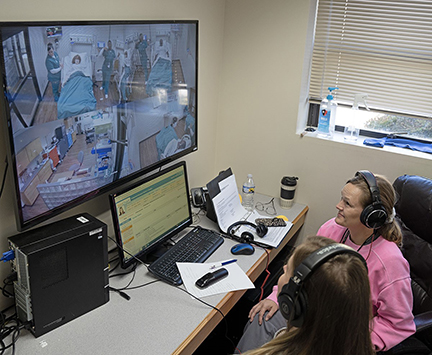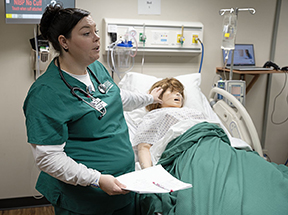College’s simulation lab enhances hands-on learning skills
 "I know that I was made with the purpose of helping.” That's how Meridian Community
College student Heather Barrett described her reason to pursue a career in nursing.
"I know that I was made with the purpose of helping.” That's how Meridian Community
College student Heather Barrett described her reason to pursue a career in nursing.
The 34-year-old Meehan resident who is already in the health care field serving as an emergency medical technician, said her decision to come to MCC was influenced by what she had learned from others about College’s Associate Degree Nursing Program and its offerings. “I want to be a better provider, a better person,” she added.
As a part of her MCC nursing education, Barrett and others studying the ADN Program receive a balance of general education and nursing courses along with planned experiences in patient care. An integral part of their studies is spending time in laboratory settings where students learn basic nursing techniques in the College's simulation (SIM) lab and ultimately care for patients in affiliated hospitals and other clinical agencies. This state-of-the-art teaching facility is located in the Dr. Betty Davis Center for Nursing Simulation Studies in Webb Hall.
"Everybody goes to SIM lab," said Dr. Lara Collum, associate vice president for nursing and health care education, "One of the main focuses (of the SIM lab) is building clinical judgment and helping students develop their clinical decision-making skills," she said.
Dr. Collum noted the facility has been updated with new equipment, such as beds, mannequins, high-fidelity patient simulators, new med dispensing systems, recording and debriefing software, and a room remodeling is underway. The additions will provide more equipment and space for small group simulation, allowing students to gain more experience.
Before the update and in previous SIM lab sessions, a cohort of students would all go to simulation on the same day at the same time. Dr. Collum explained, "We would run the scenarios, but the students would be in groups of four or sometimes more. We found that was too many students trying to take care of a patient. While one or two may take care of the patient, the others may step back and watch and not do," she said.
"We committed to rethinking simulation and do very small group simulation allowing students more one-on-one situations where they were the nurse in the room, caring for one or two patients,” she said.
 While students are in the SIM lab, the faculty member can watch them the entire time.
"When they're in the clinical setting, that faculty member watches 10 students. They
can't be in every room with every student simultaneously,” Dr. Collum said. The SIM
Lab's recording and debriefing software enables faculty members to make notes as the
simulation continues, pointing out where the students did well and where they need
improvements.
While students are in the SIM lab, the faculty member can watch them the entire time.
"When they're in the clinical setting, that faculty member watches 10 students. They
can't be in every room with every student simultaneously,” Dr. Collum said. The SIM
Lab's recording and debriefing software enables faculty members to make notes as the
simulation continues, pointing out where the students did well and where they need
improvements.
The SIM lab counts as clinical time. MCC adheres to the accreditation guidelines that up to 25 percent of clinical hours can be simulated without special approval from the Institutions of Higher Learning. The MCC ADN Program provides students 90 hours of clinical time in the first semester and 180 hours in the second, third, and fourth semesters.
In addition, the SIM Lab is the College's commitment to providing high-quality education to its students, and it's reflected in the College's National Council Licensure Examination (NCLEX-RN) pass rate. For the calendar year of 2022, the pass rate for NCLEX first write was 87 percent, higher than the national pass rate of 79 percent.
After her first experience in the SIM Lab, Barrett and her fellow students were debriefed by their instructor, Wendie Mangum, who asked them why they saw this SIM patient first instead of the other "If you learn something from SIM, you call it a win," said Mangum. "If you don't think you did your best, you have multiple opportunities to improve."
To learn more about MCC’s Associate Degree Nursing Program or allied health programs, visit meridiancc.edu/nursing.

